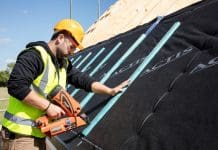A recent poll by structural warranty provider LABC Warranty found that the availability of land – for so long the number one hurdle for housebuilders to leap – no longer features in the top three challenges the construction sector faces
The biggest concern now, not surprisingly, is the availability and rising costs of products and materials (69% of 2,000 respondents). Next comes access to skilled workers and tradespeople (55%), followed by obtaining planning permission (29%). Just 24% cited land as a major concern.
Yet the housebuilding sector remains remarkably resilient. Recent government figures reported that almost 50,000 new homes were built in the first three months of 2021, the highest quarter figure for more than 20 years.
The buoyant market has been felt at LABC Warranty too, with near-record sales for Q1 and a record-breaking month in June. Yet the challenges are being felt, via the organisation’s risk management surveyors, customer-facing account managers and their technical support staff.
Technical director Sarah Sheppard reports increasing enquiries on the deployment of alternative construction methods and products, use-cases that need to achieve both regulatory and warranty risk-assessment standards. The company has introduced an Innovations Team to take charge of a rapidly growing areas of the business.
Embracing MMC
While the industry’s embrace of modern methods of construction may be proving as tentative as a post-pandemic hug, rising material costs and restricted access to “traditional” housebuilding skills may be forcing developers to look at substitute products.
For MMC supporters, this may be no bad thing. Yet this doesn’t – for now – appear to signal any sudden, more widespread use of alternative methods. The same poll showed that an overwhelming 83% of housebuilders will continue to use the traditional “brick and block” approach through the next 12 months.
“We’re busy bringing on new sites and issuing completion certificates, which is great and there’s certainly a buzz about the business as the pandemic restrictions ease. Yet at the same time, there aren’t many here that get the sense that things are going ‘back to normal’,” Sheppard said.
“Housebuilders are facing uncertainty about the post-pandemic world in all sorts of ways, not least the cost and availability of materials but also a rising scarcity of construction skills.
“Demand for housing is still there – neither Brexit nor the pandemic appears to have changed that. But it’s possible that the locations and property types that were desirable before the pandemic are less so now. We’ve heard a lot about how businesses are adopting homeworking and developers and planners are still trying to assess what this means for future housing supply.”
On top of uncertainty, big regulatory changes are coming. Proposed new planning rules are yet to come into effect but already they have divided opinion. Final implementation and impact remains to be seen.
At a more advanced stage and driven by long-term goals few would argue against – better building safety and tackling climate change – the impacts of the Building Safety Bill now passing through parliament and the Future Homes Standard are going to be felt within a few years of each other.
“The sector’s preparing to improve the eco standards of housing across the UK – this will include adopting heating systems using low-carbon methods,” Sheppard added.
“No one is under any illusion what that entails – improved insulation, air-tightness and ventilation, and the practical implications of alternative heat sources that may require, depending on the context, larger radiators, underfloor heating and the reintroduction of hot water tanks.
“While the Building Safety Bill has set its sights on buildings 18m and taller, there’s no doubt that developers of lower-rise accommodation blocks are considering the implications. There’s already been some discussion about whether the threshold height should be lowered to 11m.”
The final piece of new regulation comes in the form of a New Homes Ombudsman. While a Housing Ombudsman has existed for many years, the New Homes version will focus on issues around new builds. It’s anticipated that housebuilders will be required to register and sign up to its code of practice, with enforcement and penalties possible for significant breaches.
“Of course, good housebuilders and developers will have nothing to fear, and those of us in the risk management business – including structural warranty providers like ourselves – want to work with the best,” Sheppard said.
“But it’s another change, another re-evaluation of existing processes or the introduction of new ones, and it’s coming now on top of everything else. It’s a lot for the biggest developers to take in, so imagine the impact all this will be having on the smaller and medium-sized businesses?”
While the fast pace of change presents many challenges, Sheppard sees opportunities for savvy developers too.
“We know we need to tackle carbon emissions and strive for net zero. We know our taller buildings need to be futureproofed and better protect residents. We know too that changes in work practices and the internet makes home-working more likely in the future,” she said.
“Whether costs go up or down, or planning takes less time or more, developers will find new opportunities here. They must if we’re to build the new, high quality homes the UK needs.”
LABC Warranty regularly adds to a range of technical guidance articles published on its Resource Hub.
The poll results in full
Poll respondents were asked three questions as part of LABC Warranty’s publication of Version 10 of its Technical Manual. For each question, more than one answer was permitted. Sample size was 1,500 and the poll was conducted from 14 June 2021 to 21 June 2021.
Sarah Sheppard
Technical director
LABC Warranty
Tel: +44 (0)800 183 1755
LinkedIn: LABC Warranty














